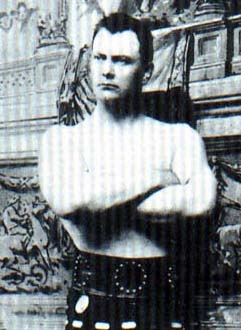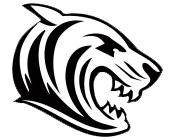
Joseph Louis Barrow was an American professional boxer who competed from 1934 to 1951. Nicknamed the Brown Bomber, Louis is widely regarded as one of the greatest and most influential boxers of all time. He reigned as the world heavyweight champion from 1937 until his temporary retirement in 1949. He was victorious in 25 consecutive title defenses, a record for all weight classes. Louis had the longest single reign as champion of any boxer in history.

Cornish wrestling is a form of wrestling that has been established in Cornwall for many centuries and possibly longer. It is similar to the Breton Gouren wrestling style. It is colloquially known as "wrasslin’" in the Cornish dialect of English; historically, this usage is attested by Chaucer, Shakespeare and Drayton.

Bill A. Muldoon was the Greco-Roman Wrestling Champion, a physical culturist and the first chairman of the New York State Athletic Commission. He once wrestled a match that lasted over seven hours.

Daniel Allen Hodge was an American amateur and professional wrestler, who also had a brief professional boxing career. He is in both the U.S. amateur wrestling Hall of Fame, for his three NCAA titles and Olympic silver medal, and the pro wrestling Hall of Fame, as a seven-time NWA World Junior Heavyweight Champion. The Dan Hodge Trophy is the college wrestling equivalent of the Heisman Trophy.

Colin Campbell Watson was an Australian rules footballer in the Victorian Football League.

David John McNamara or M'Namara was an Australian rules footballer in the Victorian Football League (VFL).

The Rochester Football Netball Club, nicknamed the Tigers, is an Australian rules football and netball club, formed at a meeting held on 8 June 1874 at Tidy's Restdown Hotel. The club was formed with the purpose of soon "playing and beating Echuca". An intense rivalry that has endured ever since regardless of which competition each was playing in.

Ambrose Harold Palmer was a talented world-class professional prize fighter and a leading Australian rules footballer of the 1930s and early 1940s.
Christopher Francis Lethbridge was an Australian rules footballer who played with Fitzroy in the VFL.
Leslie Thomas Harley was an Australian boxer who competed in the 1936 Summer Olympics.
August Johannes Kippasto was a Russian later Estonian wrestler who competed for Russian Empire at the 1912 Summer Olympics in Stockholm.

In boxing, a weight class is a measurement weight range for boxers. The lower limit of a weight class is equal to the upper weight limit of the class below it. The top class, with no upper limit, is called heavyweight in professional boxing and super heavyweight in amateur boxing. A boxing match is usually scheduled for a fixed weight class, and each boxer's weight must not exceed the upper limit. Although professional boxers may fight above their weight class, an amateur boxer's weight must not fall below the lower limit. A nonstandard weight limit is called a catchweight.

Bill Lang was an Australian professional boxer who held the national heavyweight title. He was also an Australian rules footballer who played with Richmond in the Victorian Football League (VFL).
Tom Berry was an English professional light-heavy and heavyweight boxer active from the 1910s to the 1930s. He won the National Sporting Club (NSC) subsequently known as the British Boxing Board of Control, the British Light Heavyweight title and the British Empire Light Heavyweight title.

Richard William "Fatty" Lamb was an Australian racing cyclist who competed on both road and track, as was typical of Australian cyclists of the era such as Hubert Opperman. Throughout his career, Lamb was associated with Malvern Star Bicycles and Bruce Small.
Stadiums Limited is an Australian company established in the late 1890s that owned and administered four venues on Australia's east coast at West Melbourne Stadium, Sydney Stadium, Leichhardt Stadium and Brisbane Festival Hall. It was founded in 1915 by John Wren and Dick Lean Senior who acted as the general manager. Incorporated in its final form in 1915, prior to this, Wren worked with Lean Senior, purchasing the various locations, including the site of what became the West Melbourne Hall, and ultimately Festival Hall from Reginald (Snowy) Baker. Stadiums initially began presenting both boxing and professional wrestling. Wren, as he did in other parts of his life, offered a great deal of money to boxers and wrestlers to perform. The operations of Stadiums Ltd changed in the second half of the 20th century, as the venues began to be predominantly used for live music and for television broadcasts. Notably, it was Dick Lean Junior as the promoter and Managing Director of Stadiums Ltd who booked the Beatles to play Australia in 1964 - arguably the most successful Concert coup in Australian entertainment history. Dick Lean became Managing Director of Stadiums, vastly increasing the Company profitability by continuing to promote and bring to Australia many of the major headline acts during the 1960s, 1970s and 1980s - all who performed in the Stadium's venues in Melbourne, Sydney and Brisbane.

Hein Müller was a German boxer, who was a champion of Europe as both an amateur and a professional. He won German amateur titles at three weights, was European amateur champion at light heavyweight, and as a professional won the German and European heavyweight titles.

Billy Meeske was an Australian professional wrestler who was three-time Australian Heavyweight Champion and one time Pacific Coast Light Heavyweight Champion.

Mick Dunn was an Australian professional boxer who competed from 1890 to 1903 and held the Australian middleweight title twice between 1900 and 1901.














